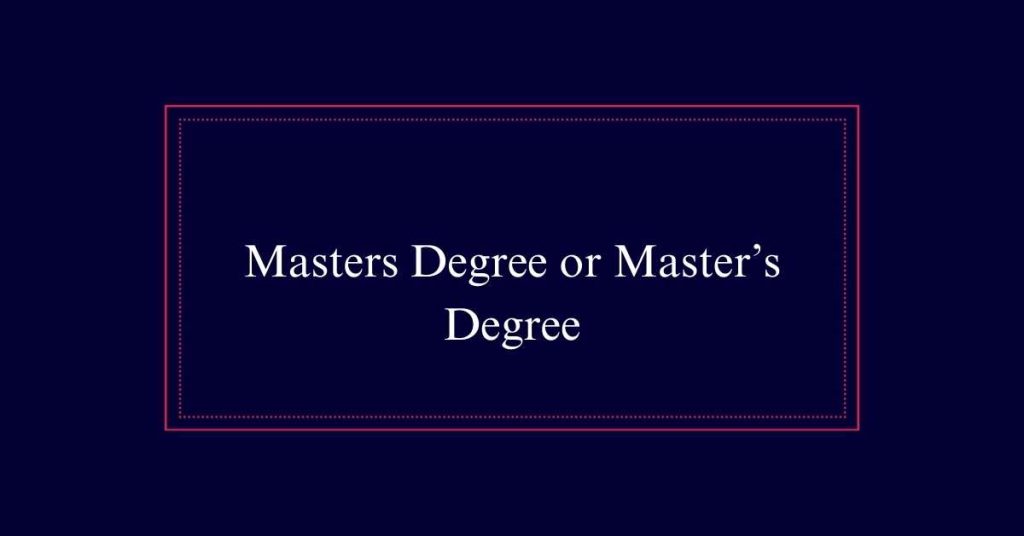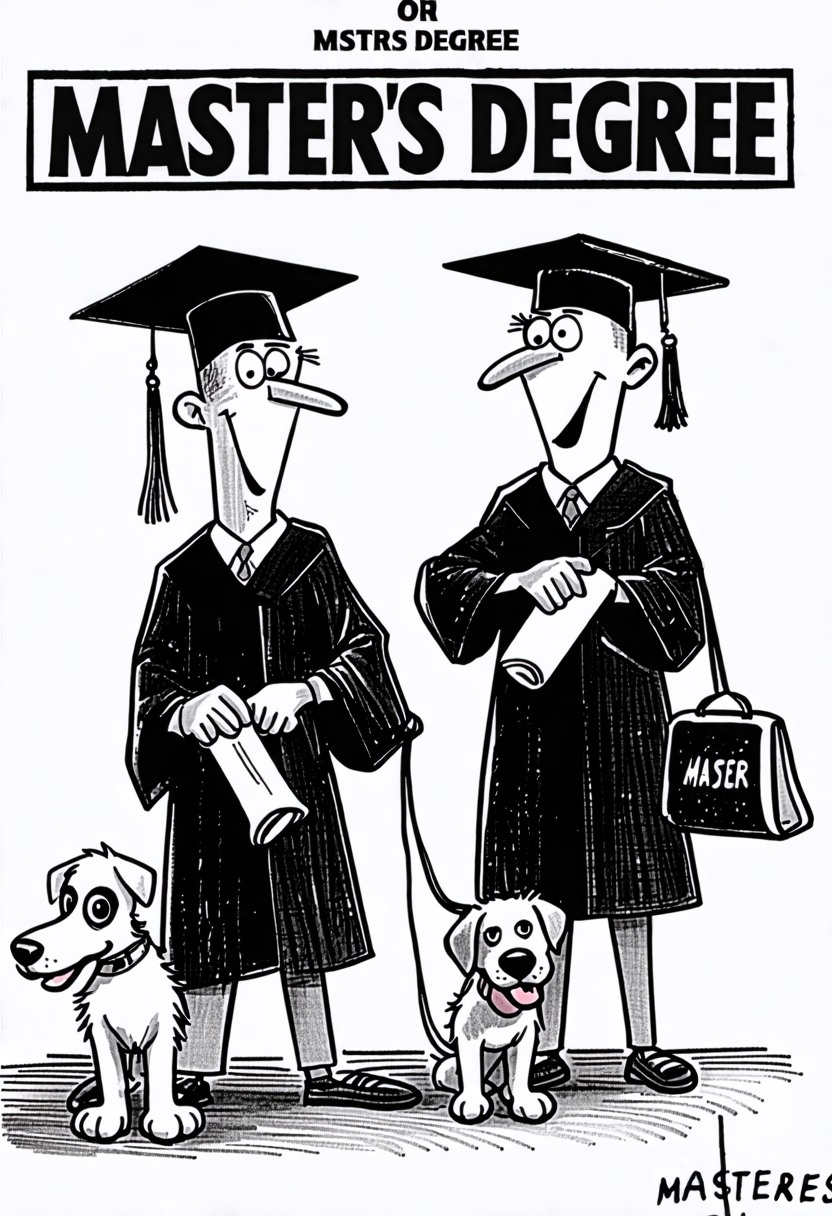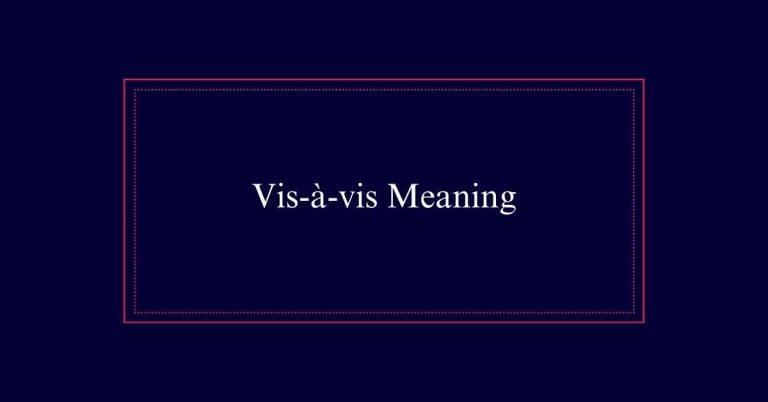Masters Degree or Master’s Degree
The correct term is “master’s degree,” with an apostrophe indicating possession. This denotes a degree earned by a master in a field of study. When mentioning a specific degree, such as “Master of Science,” capitalize both “Master” and the area of study, but do not use the possessive form. Incorrect usage undermines professionalism and clarity.
Common abbreviations like MS for Master of Science and MBA for Master of Business Administration should be used where applicable. Using precise terminology reflects professionalism and credibility.
Correct Spelling
The correct spelling of ‘master’s degree’ requires an apostrophe to denote possession. This indicates that the degree belongs to someone who has mastered a field of study.
Correct spelling is essential to reflect professionalism and knowledge. When referring to a specific degree, capitalize and format it as ‘Master of [Field].’ For instance, one might earn a Master of Arts in History.
Incorrect spelling, such as ‘masters degree’ without the apostrophe, can detract from credibility. Hence, always use ‘master’s degree’ to show possession.
Possessive Explanation
Understanding the possessive form of ‘master’s degree’ helps clarify its correct usage and meaning.

The term ‘master’s degree’ uses an apostrophe to signify possession. This indicates that the degree belongs to a master, reflecting the expertise achieved in a specific field of study.
Hence, the correct spelling is ‘master’s degree,’ not ‘masters degree.’ This possessive form underscores the advanced level of education attained.
Specific Degree Capitalization
Proper capitalization of specific degrees is essential for maintaining clarity and professionalism in written communication. When referring to a specific degree, capitalize both ‘master’ and the field of study. For instance, write ‘Master of Arts in History’ rather than ‘masters of arts in history’.
Similarly, capitalize ‘bachelor’ when mentioning degrees such as ‘Bachelor of Science in Biology’. This rule helps differentiate between general and specific references to academic qualifications.
Accurate capitalization also avoids confusion and maintains a professional tone in your writing. Always remember to use an apostrophe in ‘master’s degree’ when not referring to a specific field, but avoid possessive forms when specifying the degree.
Examples of Usage
Many examples highlight the importance of correct usage in writing about academic degrees. For instance, Western Illinois University ranks second nationally for a master’s degree in physics. Here, the possessive form ‘master’s’ is accurately used to indicate the degree belongs to a master.
Similarly, graduates receiving a Master of Arts in Linguistics demonstrate the proper capitalization for specific degrees.
In another example, students pursuing a Master of Fine Arts degree should always use the apostrophe for accuracy. Such accurate usage reflects professionalism and attention to detail.
Common Abbreviations
Various common abbreviations exist for bachelor’s degrees, reflecting the diversity in fields of study. For instance, Bachelor of Science can be abbreviated as BS, B.S., BSc, SB, S.B., or Sc.B. Similarly, a Bachelor of Arts degree is often abbreviated as BA or B.A. These abbreviations help guarantee communication and documentation is simplified.
Master’s degrees also have standard abbreviations. A Master of Science is commonly abbreviated as MS or M.S., while a Master of Arts is often abbreviated as MA or M.A. Specialized degrees like Master of Business Administration are abbreviated as MBA.
Avoiding Misspellings
Ensuring correct spelling of academic degrees is essential for maintaining professionalism and credibility. Misspellings can undermine your expertise and the seriousness of your work.
To avoid common errors, remember the following key points:
- Use an apostrophe: Write ‘master’s degree’ to show possession.
- Capitalize correctly: When specifying the degree, use ‘Master of [Field]’ with proper capitalization.
- Proofread carefully: Double-check spelling and formatting to prevent mistakes.
Correct spelling reflects attention to detail and respect for the academic community. Missteps in spelling or formatting can be easily avoided with a little diligence.
Professionalism in Writing
Maintaining professionalism in writing involves careful attention to detail and adherence to proper spelling and formatting conventions. This is essential in academic and professional contexts, where mistakes can undermine credibility.
Correctly spelling terms like ‘master’s degree’ with an apostrophe, and capitalizing specific degree titles, reflects a commitment to accuracy. For example, ‘Master of Science’ should be capitalized and formatted correctly. These practices promote clarity and respect for the subject matter.
Importance of Details
Paying close attention to detail is essential for guaranteeing accuracy and professionalism in writing. Small errors can undermine the credibility of a document, particularly when discussing academic degrees. Precision in language use reflects a high level of expertise and reliability. Here are some key reasons why details matter:
- Clarity: Correct spelling and punctuation guarantee the message is clear and understood.
- Credibility: Accurate details enhance the trustworthiness of the information.
- Professionalism: Attention to detail showcases a commitment to quality and excellence.
Correct Degree Formatting
Proper formatting of academic degrees is essential for maintaining clarity and professionalism in written communication.
When referring to a general degree, use the possessive form: ‘master’s degree’ or ‘bachelor’s degree.’ This indicates the degree belongs to a master or bachelor.
When mentioning a specific degree, capitalize and format it correctly: ‘Master of Arts’ or ‘Bachelor of Science.’ Abbreviations should also be used accurately. For example, Bachelor of Science may be abbreviated as ‘B.S.’ or ‘BSc.’
Correct spelling and capitalization reflect attention to detail and show professionalism. Avoid common mistakes like omitting the apostrophe or using incorrect capitalization. Proper formatting ensures your credentials are presented accurately and professionally.
Showcase Expertise
Proper formatting not only guarantees clarity but also serves to showcase your expertise in written communication. By adhering to established conventions, you demonstrate attention to detail and professionalism. Using the correct possessive form of ‘master’s degree’ is essential. It reflects a deep understanding of grammar and proper usage.
To further emphasize your expertise, consider the following points:
- Consistency: Maintain uniformity in the capitalization and formatting of degrees throughout your document.
- Accuracy: Double-check the possessive form, especially in formal contexts, to maintain credibility.
- Precision: Use specific degree titles accurately, such as ‘Master of Science’ or ‘Master of Arts.’







